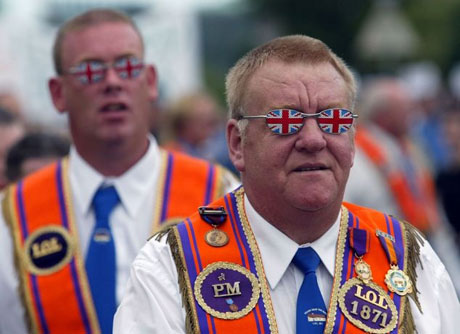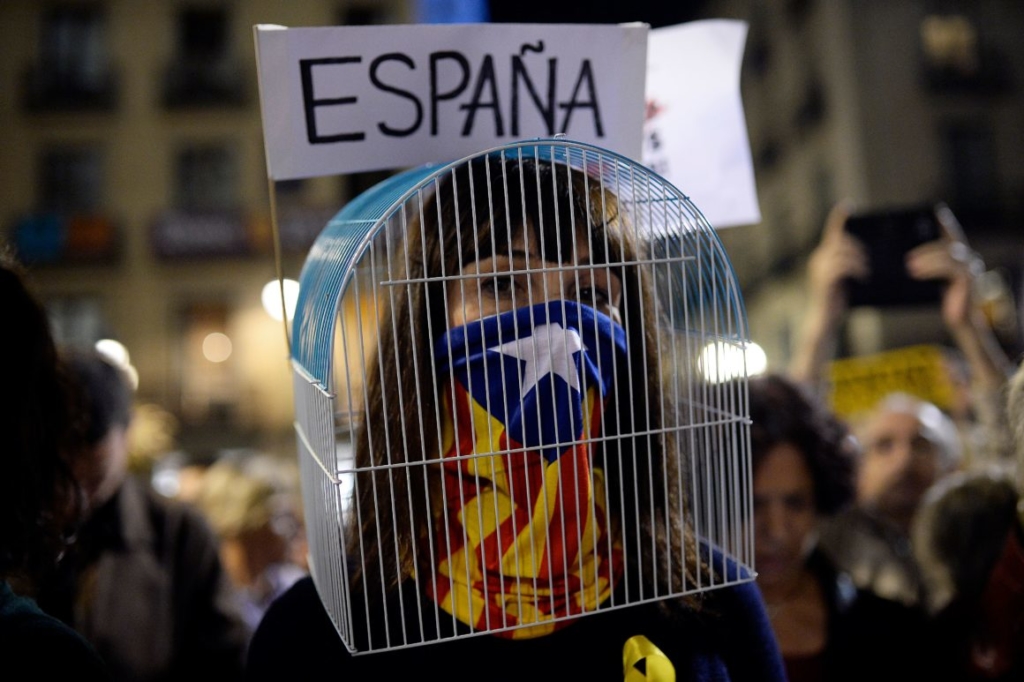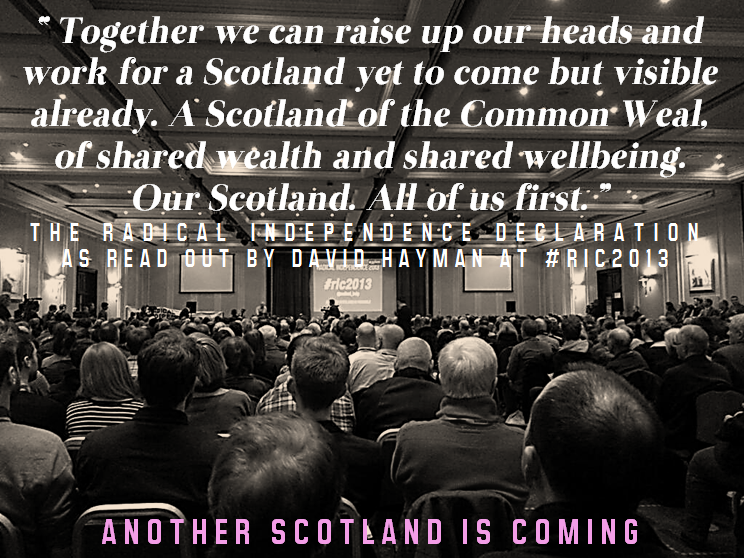Freedom Come All ye

From ‘Shy Imperial Bombast’ to the full panoply of the UK states’ Crown Powers
Mike Small’s article ‘Shy Imperial Bombast’ continues his very welcome chronicle of UK unionist and imperial decline. This was highlighted by ‘IndyRef1’ in 2014. This referendum was backed by the Tories, Lib-Dems and New Labour alike, to marginalise an SNP government then led by the cocky Alex Salmond.` But all their ‘victory’ did was to mainstream Scottish independence as a major political issue in the UK.
This was followed by the 2016 Brexit vote to ‘bring back control’ to the highly centralised and anti-democratic UK state. In the process, the ‘federalism’ and ‘parity of esteem’, promised to the three nations and one province in the UK state in 2014, have been quickly abandoned. Scotland, Northern Ireland and Welsh-speaking Wales voted to Remain in the EU. Therefore, Brexit can only be imposed by rolling back the limited democratic concessions that have been place since the post-1998 ‘Devolution-all-round’ settlement.
Mike joins many people in Scotland in their sheer incredulity over Johnson’s visit to Scotland on January 28th. Johnson thinks he can persuade us of the benefits of the Union and Brexit. We are already European leaders – in Covid-19 death rates! However, this visit wasn’t just typical Johnson individualist bombast. This was shown by the support of Sir Keir Starmer and Jackie Baillie for Johnson’s visit. Starmer has belatedly realised that the majority of the British ruling class now supports Brexit. The Bank of England governor, Mark Carney’s backed Johnson’s Brexit deal prior to the December 12th, 2019 Westminster general election. However, Starmer’s no. 1 priority at the time was to extinguish the threat represented by then British Labour leader, Jeremy Corbyn. As opinion poll ratings for the Tories climbed steadily in England and Wales, British employers were licking their lips at the prospect of rolling back existing worker, consumer and environmental regulations.
But now that Starmer can see the majority of the British ruling class wants Brexit, he has quickly fallen into line. British Labour has returned to its Blairite role of acting as the ‘fire and theft’ insurance back-up for the British ruling class. Hence Johnson’s and Baillie’s socially-distanced ‘Better Together’ appeal last week to uphold the Union. However, trying to out-unionist the Tories on these political grounds only highlights the Scottish Labour branch office disconnect from any reality in Scotland.
Too much focus on Johnson’s apparent bumbling ineptitude disguises the real source of his power. We don’t live in a democracy, where sovereignty lies with the people, or even with Westminster, but with the Crown-in-Westminster. The Crown has relatively little to do with the monarchy, obscenely privileged though it is). The monarchy provides the constitutional front for the formidable range of anti-democratic Crown Powers, wielded by the wider British ruling class. These powers include provision for emergency rule by the Privy Council, without the necessity for any unsavory coup.
Johnson might have slightly overstepped the mark, with his attempted prorogue Westminster ‘coup’ in August 2018, but he only received the mildest rap over the knuckles (he had to give ‘Elizabrit’ an apology). The awe in which constitutional politicians hold the Privy Council has been shown by Jeremy Corbyn, whilst he was still Labour leader, and by Nicola Sturgeon, in their acceptance that the business the ruling class chooses to divulge to them remains a secret. This knowledge is not be shared with their parties, Westminster or Holyrood, and certainly not with the people.
The looming May 2021 Holyrood election and politics on the streets
Thus, even if the very timid SNP government wins this May’s Holyrood election, as seems likely, and proceeds with a consultative ballot on independence, ‘IndyRef2’, this is far from the end of the game for the British ruling class. We have already witnessed how another unionist government in Spain (using the semi-Francoist constitution and state apparatus, rather than any Crown Powers) has dealt with such a referendum in Catalunya. And anyone who argues that British ruling class wouldn’t resort to such methods is ignoring their record in Ireland. In the 1960s, the Northern Ireland Civil Rights Movement began by calling for Catholics to have the same civil rights that existed elsewhere in the UK and not be discriminated against. The 1st Battalion of Parachutists’ killing spree in Ballymurphy in 1970 and ‘Bloody Sunday’ in Derry on 30.1.71, contributed to more than thirty years of repression. Bernadette McAliskey has termed the shocked response in the growing Irish nationalist ‘communities of resistance’ as “republicanism for slow learners”.
But such a resort to violence is unlikely to be the immediate response of Johnson’s government and the UK state in Scotland, in the event of a majority SNP majority government in May. The SNP leadership fully accepts the sovereignty of the Crown-in-Westminster, and its devolved Holyrood offspring, so such drastic measures are not yet needed. Their acceptance of the existing constitutional set-up provides the UK state with a whole range of political possibilities to stymie any constitutional opposition.
These could include more meaningless ‘vows’ promising a future ‘federal UK’ – a constitutional impossibility, when sovereignty lies with the Crown-in-Westminster. A time wasting Royal Commission is another possibility. Or an independence referendum could actually be held, but on UK government terms with abstentions counted as ‘Nos’, or a two thirds majority threshold. There could also be a rigged electoral franchise, such as that used in the 2016 Brexit referendum to exclude most non-British EU residents. They had the vote in ‘IndyRef1’ in 2014, as did 16-18 year olds. The Tory promoted, Labour supported, British ethnic nationalist franchise in 2016 was designed to undermine the civic national alliance which underpinned the ‘IndyRef1’ campaign.
The British Labour Party has form and has been central to such political manoeuvres in the past. This underscores their central ‘fire and theft’ insurance role for the British ruling class. But if necessary, Labour can dredge even lower. This was shown by Gordon Brown’s right populist resort to “British Jobs for British workers”, borrowed from the neo-fascist BNP and the earlier National Front; and by Labour controlled Glasgow City Council’s overtures to the Orange Order and sponsorship of the OrangeFest in 2015.

Politics in Scotland are now coming to a new watershed This has been the background to a number of key events which have been held here over the last few months. However, first there is a non-event – no SNP conference to discuss Plan B, in the face of Johnson’s Tory government refusing to sanction a `Section 30’ order. Clearly the SNP leadership has gone out of its way to suppress any voices suggesting that the party may need a back-up option. This has led to high tension and acrimony within SNP ranks. Indeed, the SNP has become the focus of a potential political ‘bloodbath’.
This has been highlighted by Alex Salmond’s successful challenge to her majesty’s Advocate over what appears to have been an SNP leadership attempt to pervert the course of justice. This has been followed by Salmond’s stepped-up challenge to the SNP inner coterie and its backers. But “sex pest” (his defence lawyer’s phrase ) Salmond has no extra-constitutional strategy to challenge the UK state. He enjoys close links to the Royal Bank of Scotland, now a branch office of the City of London.
The second very public indication of a deep divide in the SNP has been Nicola Sturgeon’s sacking of Joanna Cherry on 1.2.21. This has been described as a “civil war”. Cherry, an ambitious careerist, has attempted to cultivate a more fundamentalist section of the party base with its unresolved prejudices. But she is even less likely than Salmond to challenge the UK state or break from the SNP.
Beyond this particularly torrid zone of Scottish politics lie the Scottish Independistas, who initially organised as ‘All Under One Banner’ (AUOB) ; and the Left wing of the movement for Scottish self-determination, the Radical Independence Campaign (RIC). Both have held recent well attended online conferences, indicating an intensified interest in Scottish politics, as the May Holyrood election and a constitutional crisis beckons.
This contrasts with the situation in England, where there has been a series of online conferences, trying to account for the collapse of Labour Left project there on December 12th 2019. The follow-up Corbynite candidate for Labour leader, Rebecca Long-Bailey, began the post-mortem by saying that, if she ever became the UK prime minister, she was quite prepared to press the nuclear button! With this inauspicious start, the Labour Left’s prolonged post-December 12th navel-gazing has neither been able to give their failed project a decent burial, or to find the seeds of any meaningful renewal.
They are so focussed on England (or often just London) they remain largely unaware that the main challenge to Johnson comes from the rising movements for national self-determination in Scotland, Ireland and Wales. Whilst Right unionists see the UK state as a vehicle for maintaining their class privileges, the Left unionists see the UK state as the necessary framework for their reforms. Democratic movements for national self-determination movements are seen as a threat to their UK state.
So, unlike the Left in England (with a few Left unionist hangers on in Scotland, Wales and even Northern Ireland), the Independistas’ and Scottish Left’s continuing engagement in wider Scottish politics represents something real and is a vital debate.
From ‘All Under One Banner to ‘Yes Alba’ and the Catalan connection ?

George Kerevan, a recent SNP MP and party dissident, has been the leading light behind ‘Yes Alba’. This represents an attempt to politicise the Independista-initiated ‘All Under One Banner’ (AUOB) movement. That means going beyond AUOB’s organisation of very impressive demonstrations to challenging an SNP leadership, increasingly bereft of ideas, for the leadership of the Scottish independence movement. George is concerned that any future referendum campaign should not be controlled in the same manipulative manner as the SNP leadership run ‘Yes Scotland’ between 2012-14. Instead, he looks to the model of the non-party Assemblea Nacional Catalana (ANC.) ANC organised the massive demonstrations in support of a new Catalan Republic, before the 27th October 2017 referendum. Unlike the ANC, which undertook this role in the run-up to the Catalan referendum, AUOB only began doing this after ‘IndyRef1’ in 2016. However, there is now greater political convergence. There is a shared understanding that any future national self-determination challenges to either the Spanish or UK state will need to be organised under a non-party controlled broad umbrella organisation. There is much merit in this.
The ‘Yes Alba’ launch, was organised at two online meetings, held on 14.11.20 and 22.1l.20. I attended both. They were impressive, both in their use of advanced electronic platforms and in their skilled chairing. However, ‘Yes Alba’ immediately came under criticism for its name [this has been repeated – Ed]. This had been inspired by the 15,000 member ‘Yes Cymru’. But Gaelic activists pointed out that the ‘Yes Alba’ name was already used by another organisation. The ‘Yes Cymru’ model also came under attack from another angle. Quite a few people thought that ‘Yes Alba’ should be an umbrella organisation for existing campaigning groups, not an individual membership body. The method of candidate presentation and election for the provisional ‘Yes Alba’ committee was also criticised. These issues can be resolved, either through a name change, by becoming a combined individual membership and umbrella organisation, and devising an improved electoral system for the new committee.
There is another issue that was not addressed at the ‘Yes Alba’ meetings. We know that the unofficial Catalan referendum wasn’t recognised by the Spanish state, and that its organisers faced police repression and the subsequent jailing or exile of leading members. Scotland has seen several demonstrations in support of exiled Catalan minister, Carla Ponsati, now resident in Edinburgh. That ‘internationalism from below’ solidarity is real.
However, the organisers of the Catalan Republic referendum were not ready for the Spanish state response, although the subsequent protests have been impressive. These include the Catalan general strike on 18.10.19. Republicanism, or the recognition of the sovereignty of the people, has been a continued feature of the Catalan movement for self-determination, ever since the Spanish Civil War. But this is not the case in Scotland, where politically organised Scottish republicanism had been marginal, from the death of John Maclean in 1923, until the Scottish Socialist Party published the Calton Hill Declaration and organised a large rally at that venue in September 2004. However only a month later this potential was torpedoed by ‘Tommygate’!
The Sovereignty of the People versus the Sovereignty of the Crown-in-Westminster and its devolved Holyrood offspring
Many on the Scottish Left, unlike those in England, are prepared to call themselves republicans. But their republicanism usually goes little further than being anti-monarchist or thinking a Republic would be a nice idea sometime after initial Scottish independence under the Crown. Thus, right at the centre of the independence debate in Scotland today is the issue of where sovereignty lies. The SNP leadership believes it wields the sovereignty of the Scottish people through its control of Holyrood. This institution has been devolved under the sovereignty of the UK’s Crown-in-Westminster constitution.
Had a ‘Yes’ vote been achieved on 18.9.14, the SNP government, after dissolving the official Yes Scotland campaign, was going to invite leading Scottish Labour, Conservative and Lib-Dem politicians into its Scottish negotiating team. They would have then bargained with the Cameron-led UK government. Entering such negotiations with the SNP leadership’s very mild ‘Indy-Lite’ proposals could only have meant significant further retreats. These would have led to a neo-unionist, ‘Scottish Free State’ under the Crown, especially since the unionists would have been represented on the independence negotiating side too!

It was during the heightened political activity during ‘IndyRef1’ in May 2014 that the RIC National Forum, the last of the three Scottish organisations, I address in this article, offered an alternative path. This was based on recognition that the sovereignty of the Scottish people is the basis for the formation of a new democratic state. Whereas the SNP leadership would be desperately trying to close down all other independence organisations, RIC would organise a conference inviting all the autonomous campaigning bodies. These would have included, for example, local ‘Yes’ groups, Women for Independence, Commonweal; supporting political organisations, e.g. local SNP branches, Scottish Greens, SSP and Scottish Labour for Independence; trade unionists, e.g. Scottish Trade Unionists for Independence and local trade union branches; supportive media, e.g. ‘The National’ and bella caledonia; and Scottish cultural organisations, e.g. the National Collective. The purpose of this would be to organise nationwide assemblies to prepare for a Constituent Assembly to draw up a new constitution.
The underlying politics of the RIC AGM
In some way, RIC’s unfulfilled vision was hanging over its two stage conference, held on 17.1.21 and 31.1.20, which I also attended. Much of this has led to post-conference acrimony, so famous or infamous on the Left everywhere. Although as the SNP’s ‘civil war’ , and Corbyn’s and Starmer’s Labour purges have shown, this is far from being an exclusive feature of the Left.
Ostensibly, the RIC debate was between the RIC Terminators and the RIC Revivers. However, the real, underlying issue, which the Terminators wanted to avoid is the development of a political strategy and campaign, which meets the challenges of today. This would mean campaigning for the sovereignty of the Scottish people against the sovereignty of the Crown-in-Westminster. This provides the only meaningful democratic and ethical basis to challenge the British unionists and Scottish constitutional nationalists, as Johnson and the UK state step up the pressure. They are rolling back the very limited national self-determination under ‘Devolution-all-round’. It is this threat that will push many more people in Scotland (and not just Scots) into ‘republicanism for slow learners.’
Many RIC Revivers, including myself, who spoke at both meetings, think that RIC’s old ‘5 Principles’ acted as a sort of Old Labour ‘Clause 4’ sentimental tokenism, to justify a commitment to an SNP led referendum campaign. But even within this narrow constraint, RIC did some excellent work, particularly in voter registration and mobilisation. This contributed to a ‘democratic revolution’ where 97% registered to vote, and 85% did so. This was something unprecedented in UK political history. Both wings of RIC can take pride in this. Both wings can also take pride in their campaigning, not just throughout Scotland, but elsewhere in the UK and Europe, as well as RIC’s solidarity work for migrants, asylum seekers and for self-determination for Catalunya, Palestine and Kurdistan.

However, the RIC Revivers, in order to address the current political situation, were going to advocate replacing RIC’s 5 Principles, which offer no guide to action, with the need for a new 5 point strategy. Such a strategy was first suggested by the RCN, one of RIC’s officially affiliated organisations in June 2020. This has been considerably revised and improved by others, inside the youthful Republican Socialist Platform and some local RIC groups. The new proposals argue that RIC should promote :-
1) A democratic, secular, socially just, environmentally sustainable, Scottish Republic
2) Action based on the sovereignty of the people not the UK Crown, leading to the setting up of a Constituent Assembly
3) Action to establish universal health, care, education, housing, income, pensions, and trade union rights; and to win land reform and challenge environmental degradation
4) Equality and opposition to discrimination on grounds of sex, gender, sexuality, race, ethnicity, religion, disability or age
5) Solidarity with the struggles for workers’ rights, democracy and self-determination, based on internationalism from below.
It was this debate which the RIC Terminators wanted to avoid being held under RIC auspices, despite the inflow of new young members and the revival of local RIC groups. The Terminators were correct in saying there has been a political division in RIC between Socialist and Social Republicans on one hand and Left Social Democrats and individualist Anarchists on the other. bella caledonia flagged this debate up as early as the first RIC conference in November 2012 (https://bellacaledonia.org.uk/2012/11/20/radical-indy-conference-10-genuine-self-determination-means-acting-like-republicans-now/). On 19.1.19 bella caledonia also picked up on another underlying division between the majority of those who are now Terminators, and the majority of those who are now Revivors. The first supported a mythical Left Brexit; the second could only see Brexit as pushing politics to the Right and strengthening the UK state (https://bellacaledonia.org.uk/2019/02/19/from-project-hope-to-project-hate/) On 24.10.19 bella caledonia also drew readers’ attention to the forthcoming debate, as RIC began to revive. (https://bellacaledonia.org.uk/2019/10/24/republican-internationalism-from-below/).
There are many political organisations and campaigning bodies, e.g. trade unions and Scottish CND, which encompass much wider political differences than those in RIC and don’t see the need to split. The decision of the Terminators to close down national RIC will not lead to the demise of either wing. They both represent components in the vibrant wider movement for Scottish self-determination. But there was only one specific proposal made by the Terminators in their contributions – a call for RIC material to be collected in a new archive. But as David Coull of Angus & Mearns RIC said, soon after the AGM , “A’m nae deid yet. I refuse tae be pit in onybiddy’s artichive.”
RIC Revivors may now be building a new national RIC organisation, a RIC21, if you like, although the new name will be decided by those involved. In the process I would argue that that the meaning of RIC’s initials should change from the politically ambiguous Radical Independence Campaign to a much clearer Republican Internationalist Coalition (for the break-up of the UK state). And the biggest factor providing future support for such politically advanced politics will lie in actions of the UK state, and the inability of the constitutional nationalist SNP to provide any effective challenge. From ‘republicanism for slow Scottish learners’ up to ‘Freedom Come All Ye’ may not be such a large leap.

It was really helpful to me to read this inside take on what’s been going on with RIC. I put a reasonable amount of time and effort into RIC over the years, but today was the first that I heard about it even considering disbanding – someone pointed me to “the Tweet”.
Regarding your take on things, I’m probably being very stupid, but having read the above I’m still not sure why the “Terminators” wanted to wrap up RIC.
You say: “…the real, underlying issue, which the Terminators wanted to avoid is the development of a political strategy and campaign, which meets the challenges of today. ”
I still don’t understand why they wanted to avoid developing a political strategy? Because ultimately they see the SNP as the legitimate vehicle?
You go on to say: “It was this debate which the RIC Terminators wanted to avoid being held under RIC auspices, despite the inflow of new young members and the revival of local RIC groups.”
I’m left still unclear what the debate was the “Terminators” wanted to avoid and why they wanted to avoid it.
I look forward to your thoughts.
An interesting and thoughtful piece Allan. Just a pity that you don’t acknowledge that your title came from the late Hamish Henderson’s inspiring plea, now over sixty years old, for an anti-racist, socialist Scotland. And that you don’t recognise that ‘our’ PM’s best way of averting a pro-independence victory at the scheduled Scottish election is simple – just cancel it. I’m sure he is considering the best way of presenting such a decision as we speak. His task has been made immeasurably easier by Nicola’s decision to sack (a now justifiably embittered) Cherry.
Watch this space. I have been saying for some time, including in a few contributions here, that the UK state machine will use anything it can find to prevent a Scottish independence majority in the scheduled 2021 election. Including just cancelling the election. The UK’s unenviable status as the covid pariah of the earth provides effective cover.
The UK Privy Council is a very curious, powerful and secretive body. A lot of UK politics effectively bypasses Parliament, and the Privy Council is one of those conduits. The British crime of dispossessing the Chagos Islanders was carried out in Council. It is naive to suppose that royals rarely wield their Crown Prerogatives, as we generally only find out decades later that their orders (or meddling) has had profound effects, either in action or suppression of change. The Queen conspired with PM and Foreign Secretary in the Tripartite Aggression (or ‘Suez Crisis’ or invasion of Egypt in 1956) and blocked various pieces of legislation before it could reach the floor of Parliament (hence the requirement to understand the difference between Queen’s Consent and Royal Assent). Scotland lost its privy council during the treaty of union period, I gather, and good riddance. Why does the SNP not boycott the UK Privy Council?
The question of transferring sovereignty from the Crown to the Scottish people should really be a no-brainer. It would change oaths (so republicans would no longer have to perjure themselves or keep out of office), but surely also constitutionally guarantee that a public interest defence will have to be heard in any legal case (and probably end the practice of secret courts for much the same reason).
Republicanism (amongst other related topics) rarely figures on the BBC. Of course the BBC is commanded by royal charter, and this royal charter is administered by… the Privy Council, its ultimate boss (apart from the Queen). I hadn’t realized that the Privy Council maintained around 600 members or so, but hey, running an empire has an unavoidable staffing footprint. Not sure what pressing business required them to meet this pandemic-besieged month (was it in person? surely Chairperson Rees-Mogg would not countenance electronic intermediation?). Hmmm…
https://privycouncil.independent.gov.uk/orders/orders-in-council/